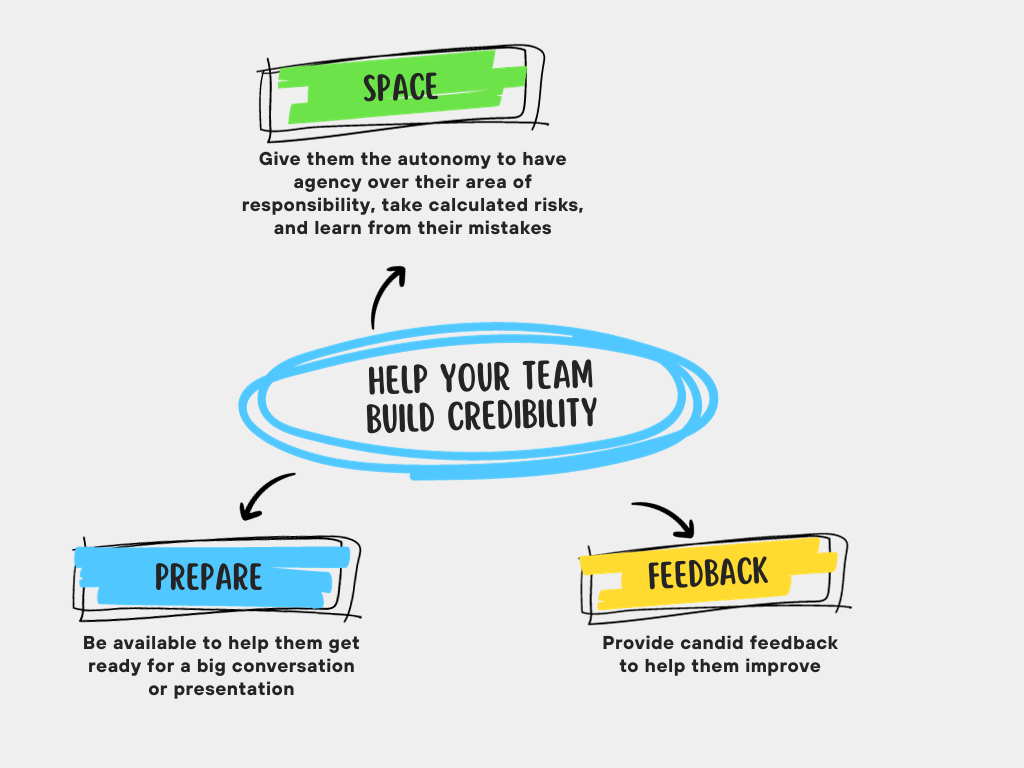A simple approach to creating a culture of appreciation and support

I once worked under a manager who was excellent at developing engineering talent. He willingly took on interns and made it a point to challenge, celebrate, and offer constructive feedback during their journey.
While working with him, I transitioned from an eager intern into a confident Controls Engineer. To this day, I often find myself reflecting on his leadership — both strengths and growth areas. Among his standout qualities was his ability to help me build my confidence as an engineer.
In this article, I will unpack a simple approach to help you empower the engineers on your team to stand tall with confidence.
Understanding why you should focus on building your team’s confidence.
My favorite leadership podcast is HBR’s Coaching Real Leaders, hosted by the insightful Muriel Wilkins. In one episode, Muriel worked with a director named “Jay,” who wanted to pursue a Chief Information Officer (CIO) role.
He candidly shared how his previous manager chipped away at his confidence by being obnoxiously aggressive, expressing no gratitude for his dedication, and failing to offer professional growth opportunities. The absence of acknowledgment for his tireless efforts left Jay lacking the confidence to take on a new position.
My takeaway: When you focus on building your team’s confidence, they become capable of delivering their absolute best work, positioning themselves for future opportunities, and taking their careers to new heights. Furthermore, this strategic investment enables you to shift your focus to your core responsibilities, such as understanding your team’s metrics, making informed hiring decisions, and thinking of strategies to help your team deliver.
Demonstrate unwavering support for your team
When your employees feel like you have their back, they become more willing to take calculated risks, make decisions, and ask for help.
I experienced the benefit of a manager supporting me while working at Schneider Electric. While my primary responsibility was testing programs, I wanted to transition into writing them from scratch. One day, the software team approached me with an opportunity to own a backlog item. Eager to prove myself, I quickly agreed without fully considering the complexity of the task. However, as I dove into the project, it became evident that I was over my head, but I wasn’t confident enough to ask for help.
The implementation day arrived, and I had to push my program into production, integrate it with a third-party app, and take it through testing with another team. Unfortunately, it was a big failure, and I felt embarrassed and anxious, dreading my manager’s reaction.
Instead of scolding me, my manager demonstrated unwavering support. With his gift of gab, he skillfully distracted the other team and redirected their efforts to another system, which gave me the time I needed to address the issues in my program.
His support gave me the confidence to resolve the issues I was having. I also felt more empowered to ask for help when I needed it.
To prove that you have your team’s back, here are some actionable steps:
- Listen Actively: Pay close attention to your team members during meetings, showing that their opinions and ideas matter.
- Clarify and Guide: Assist them in clarifying their thoughts and ideas, helping them navigate challenges effectively.
- Support Proactively: Offer assistance when tasks or projects are not moving forward; don’t wait for an invitation to help.
Help them build credibility in the organization
Empowering your team to excel often begins with giving them a sense of autonomy and agency, as recommended by the author of “Radical Candor,” Kim Scott. However, operating autonomously can be challenging, especially for new engineers.
When onboarding a new engineer, you should meet with them more often and provide clear guidance. My first manager at Amazon was good at this.
One day, a partner team emailed my manager and me. They asked us if we could expand the scope of our project. Instead of swiftly responding himself, my manager opted for a different route. He reached out to me privately, recognizing this as a learning opportunity.
We decided delivering their request as a separate project would be best, and he asked me to respond. While he could have resolved it in 30 seconds, he chose to coach me through the situation. This approach allowed me to begin earning credibility within the organization.
Fast forward to today, I use a similar approach during my 1:1s with team members. I provide guidance and then offer to get directly involved, giving them the choice. More often than not, they take care of it themselves, which I respect and mark as something to follow up with in our next conversation.
Other ways you can help them build credibility:
- Prepare: Be available to help them get ready for a big conversation or presentation
- Space: Give them the autonomy to have agency over their area of responsibility, take calculated risks, and learn from their mistakes
- Feedback: Provide candid feedback to help them improve

Provide learning opportunities to your team so they can add to their toolbox
My skip-level manager once told me that everything you learn becomes a new skill or resource you can add to your toolbox. I’m a lifelong learner, so he didn’t need to convince me to learn new things, but the toolbox reference was unique and stuck with me.
Something I always wanted to add to my toolbox was the ability to present in front of a group. In college, the mere thought of public speaking made my heart race. Anxiety took hold, and I struggled to deliver my speech. It reached a point where a friend would silently signal me to slow down as a gentle reminder to regain my composure.
This anxiety around public speaking followed me into my professional career. I tried to avoid presenting as much as possible and succeeded.
But, when I accepted an engineering manager role, I had to start getting comfortable addressing a group. It started small. I initially spoke in front of my team.
Then, in January, came a pivotal turning point. My manager asked me to deliver presentations to my entire department twice a month. Speaking to everyone was daunting, but I recognized it as an opportunity to improve my presentation skills.
Over the following eight months, I encountered my fair share of stumbles and setbacks in front of my colleagues (including my employees). Yet, with each presentation, I learned something new. I persevered, and recently, my manager complimented me on my progress.
Here’s the takeaway: Your team’s learning opportunities should be tailored to their interests and the required skills for their current roles or future aspirations. Consider investing in specialized training or assigning stretch goals, such as presenting in front of the department, leading a technical initiative, or embracing a fresh challenge.
Above all, what truly matters is allowing your team to expand their skill sets. With each skill they acquire, their confidence grows, equivalent to adding valuable tools to their professional toolbox.
Celebrate when they deliver

As you collaborate with your team, you’ll gradually uncover their unique backgrounds, experiences, and the formidable challenges they’ve overcome during their careers. These insights become invaluable when recognizing their hard work — a crucial step many engineering managers overlook.
Fortunately, I learned the significance of celebrating hard work during college, thanks to a wise professor who added an eighth step to the traditional seven-step troubleshooting process: take pride.
Yet, when I landed a full-time engineering role at Schneider, I focused predominantly on proving myself and often forgot to take pride in my accomplishments. Fortunately, my manager recognized the importance of acknowledging my successes. Their feedback motivated me to tackle complex problems and think innovatively about my team’s challenges.
As a manager, it’s imperative to remember the power of gratitude when your team successfully resolves an issue, supports a customer, or lends a helping hand to a colleague. If your company has an appreciation system, embrace it, as it can be instrumental in their professional growth and advancement.
Use the Situation-Behavior-Impact (SBI) framework when offering positive or constructive feedback. Instead of a generic “Good job,” offer specifics like “I recognize that you tackled a challenging problem head-on, delving deep to find a solution for our customer. Thank you for being so dedicated.” This approach validates their achievements and provides actionable insights for continuous improvement.
Conclusion
By focusing on building your team’s confidence, you create a culture of appreciation and support and ultimately drive them toward tremendous success within your organization.
How You Can Build Your Team’s Confidence (and Why You Should) was originally published in Better Programming on Medium, where people are continuing the conversation by highlighting and responding to this story.